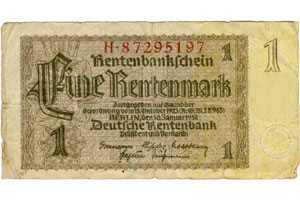Get the latest financial news, insights and expert analysis from our award-winning MoneyWeek team, to help you understand what really matters when it comes to your finances.
You are now subscribed
Your newsletter sign-up was successful
Want to add more newsletters?

Twice daily
MoneyWeek
Get the latest financial news, insights and expert analysis from our award-winning MoneyWeek team, to help you understand what really matters when it comes to your finances.

Four times a week
Look After My Bills
Sign up to our free money-saving newsletter, filled with the latest news and expert advice to help you find the best tips and deals for managing your bills. Start saving today!

Germany funded itself in World War I by printing money, drastically devaluing its currency. Post-war, it also turned to the presses to cover reparations.
But as these were payable in a foreign currency and gold, printing had to keep pace with the falling value of the German mark. As a result, prices soared 15-fold between June and November 1922 alone.
Things got worse after Belgium invaded the Ruhr, Germany's industrial region, to take reparations in goods. Strikes caused a collapse in output, and attempts to pay workers' wages with more printed money turned inflation into hyperinflation.
MoneyWeek
Subscribe to MoneyWeek today and get your first six magazine issues absolutely FREE

Sign up to Money Morning
Don't miss the latest investment and personal finances news, market analysis, plus money-saving tips with our free twice-daily newsletter
Don't miss the latest investment and personal finances news, market analysis, plus money-saving tips with our free twice-daily newsletter
By November 1923, prices were nearly a trillion times pre-war levels. Amid growing anarchy, culminating in the Beer Hall Putsch, which saw the arrest of Adolf Hitler, Berlin created the rentenmark (RM). It was worth one billion old marks and linked to the US dollar. It was also backed by gold via the Deutsche Rentenbank, which held land and goods.
Prices stabilised, and those speculating on further depreciation made huge losses. Both currencies were superseded by the reichsmark in April 1924, though rentenmarks remained legal tender until the Deutschmark was launched in 1948.
Historian Constantino Bresciani-Turroni has described the end of hyperinflation as the "miracle of the rentenmark". But the end of the Ruhr strikes in 1923 and the Dawes Plan in 1924, which cut the level of reparations, also helped.
Get the latest financial news, insights and expert analysis from our award-winning MoneyWeek team, to help you understand what really matters when it comes to your finances.
MoneyWeek is written by a team of experienced and award-winning journalists, plus expert columnists. As well as daily digital news and features, MoneyWeek also publishes a weekly magazine, covering investing and personal finance. From share tips, pensions, gold to practical investment tips - we provide a round-up to help you make money and keep it.
-
 Should you buy an active ETF?
Should you buy an active ETF?ETFs are often mischaracterised as passive products, but they can be a convenient way to add active management to your portfolio
-
 Power up your pension before 5 April – easy ways to save before the tax year end
Power up your pension before 5 April – easy ways to save before the tax year endWith the end of the tax year looming, pension savers currently have a window to review and maximise what’s going into their retirement funds – we look at how

